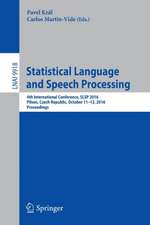Progress in Artificial Intelligence: 6th Portuguese Conference on AI, EPIA `93, Porto, Portugal, October 6-8, 1993. Proceedings: Lecture Notes in Computer Science, cartea 727
Editat de Michel Filgueiras, Luis M.M. Damasen Limba Engleză Paperback – 21 sep 1993
Din seria Lecture Notes in Computer Science
- 20%
 Preț: 1061.55 lei
Preț: 1061.55 lei - 20%
 Preț: 307.71 lei
Preț: 307.71 lei - 20%
 Preț: 438.69 lei
Preț: 438.69 lei - 20%
 Preț: 645.28 lei
Preț: 645.28 lei -
 Preț: 410.88 lei
Preț: 410.88 lei - 15%
 Preț: 580.46 lei
Preț: 580.46 lei - 17%
 Preț: 427.22 lei
Preț: 427.22 lei - 20%
 Preț: 596.46 lei
Preț: 596.46 lei -
 Preț: 381.21 lei
Preț: 381.21 lei - 20%
 Preț: 353.50 lei
Preț: 353.50 lei - 20%
 Preț: 1414.79 lei
Preț: 1414.79 lei - 20%
 Preț: 309.90 lei
Preț: 309.90 lei - 20%
 Preț: 583.40 lei
Preț: 583.40 lei - 20%
 Preț: 1075.26 lei
Preț: 1075.26 lei - 20%
 Preț: 310.26 lei
Preț: 310.26 lei - 20%
 Preț: 655.02 lei
Preț: 655.02 lei - 20%
 Preț: 580.93 lei
Preț: 580.93 lei - 20%
 Preț: 340.32 lei
Preț: 340.32 lei - 15%
 Preț: 438.59 lei
Preț: 438.59 lei - 20%
 Preț: 591.51 lei
Preț: 591.51 lei - 20%
 Preț: 649.49 lei
Preț: 649.49 lei - 20%
 Preț: 337.00 lei
Preț: 337.00 lei -
 Preț: 449.57 lei
Preț: 449.57 lei - 20%
 Preț: 607.39 lei
Preț: 607.39 lei - 20%
 Preț: 1024.44 lei
Preț: 1024.44 lei - 20%
 Preț: 579.30 lei
Preț: 579.30 lei - 20%
 Preț: 763.23 lei
Preț: 763.23 lei - 20%
 Preț: 453.32 lei
Preț: 453.32 lei - 20%
 Preț: 575.48 lei
Preț: 575.48 lei - 20%
 Preț: 585.88 lei
Preț: 585.88 lei - 20%
 Preț: 825.93 lei
Preț: 825.93 lei - 20%
 Preț: 763.23 lei
Preț: 763.23 lei - 17%
 Preț: 360.19 lei
Preț: 360.19 lei - 20%
 Preț: 1183.14 lei
Preț: 1183.14 lei - 20%
 Preț: 340.32 lei
Preț: 340.32 lei - 20%
 Preț: 504.57 lei
Preț: 504.57 lei - 20%
 Preț: 369.12 lei
Preț: 369.12 lei - 20%
 Preț: 583.40 lei
Preț: 583.40 lei - 20%
 Preț: 343.62 lei
Preț: 343.62 lei - 20%
 Preț: 350.21 lei
Preț: 350.21 lei - 20%
 Preț: 764.89 lei
Preț: 764.89 lei - 20%
 Preț: 583.40 lei
Preț: 583.40 lei -
 Preț: 389.48 lei
Preț: 389.48 lei - 20%
 Preț: 341.95 lei
Preț: 341.95 lei - 20%
 Preț: 238.01 lei
Preț: 238.01 lei - 20%
 Preț: 538.29 lei
Preț: 538.29 lei
Preț: 336.54 lei
Preț vechi: 420.67 lei
-20% Nou
Puncte Express: 505
Preț estimativ în valută:
64.40€ • 67.41$ • 53.60£
64.40€ • 67.41$ • 53.60£
Carte tipărită la comandă
Livrare economică 31 martie-14 aprilie
Preluare comenzi: 021 569.72.76
Specificații
ISBN-13: 9783540572879
ISBN-10: 3540572872
Pagini: 380
Ilustrații: XII, 368 p.
Dimensiuni: 155 x 235 x 20 mm
Greutate: 0.53 kg
Ediția:1993
Editura: Springer Berlin, Heidelberg
Colecția Springer
Seriile Lecture Notes in Computer Science, Lecture Notes in Artificial Intelligence
Locul publicării:Berlin, Heidelberg, Germany
ISBN-10: 3540572872
Pagini: 380
Ilustrații: XII, 368 p.
Dimensiuni: 155 x 235 x 20 mm
Greutate: 0.53 kg
Ediția:1993
Editura: Springer Berlin, Heidelberg
Colecția Springer
Seriile Lecture Notes in Computer Science, Lecture Notes in Artificial Intelligence
Locul publicării:Berlin, Heidelberg, Germany
Public țintă
ResearchCuprins
Organizations as complex, dynamic design problems.- Specifying and verifying distributed Intelligent systems.- A logical approach for distributed truth maintenance.- Building text temporal structure.- Resolution of constraints in algebras of rational trees.- Inheritance in a hierarchy of theories.- Semantics of interworking knowledge based systems.- Combining terminological logics with tense logic.- Towards complete answers in concept languages.- Version space algorithms on hierarchies with exceptions.- Regular languages and a class of logic programs.- Some results on the complexity of SLD-derivations.- An or-parallel prolog execution model for a distributed shared memory machine.- Diagnosis and debugging as contradiction removal in logic programs.- Well-founded approximations of autoepistemic logic.- A process model for default logic and its realization in logic programming.- A unified approach to default reasoning and belief revision.- Second order E-matching as a tool for automated theorem proving.- Attribute-specific interchangeability in constraint satisfaction problems.- The use and interpretation of meta level constraints.- Preliminary formalization of an incremental hierarchical constraint solver.- Fast methods for solving linear diophantine equations.- A note on Chapman's Modal Truth Criterion.- Learning operators while planning.- Evaluating evidence for motivated discovery.- How to learn in an incomplete knowledge environment: Structured objects for a modal approach.- The semantics of rational contractions.- A uniform framework for Deductive Database derivation strategies.- Assumption set semantics (The procedures).- Bargaining agents.- A constraint maintenance algorithm based on value propagation.- A text-to-phoneme translator for the Portuguese language.- Learning probabilistic models by conceptual pyramidal clustering.

















